Sidhu Moose Wala: What we know about India rapper's murder
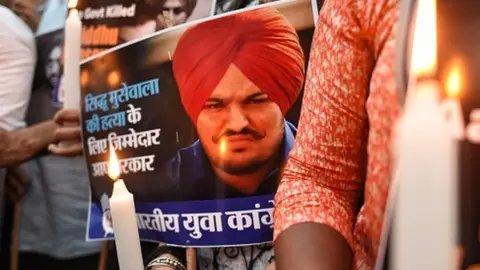 Hindustan Times
Hindustan TimesPolice in the Indian capital, Delhi, have made three new arrests in connection with the killing of singer Sidhu Moose Wala.
The Punjabi rapper, who is credited with popularising rap in rural areas, was shot dead on 29 May when his car was ambushed by unidentified gunmen.
His death sparked deep anger and outrage as fans from across the world mourned the loss of the eclectic pop star.
On Sunday, police seemed to have made a breakthrough in the case, when they arrested two men suspected of being the "two main shooters" and another suspect from the western state of Gujarat.
At a press conference on Monday, HS Dhaliwal, commissioner of Delhi police's special cell investigating the killing, alleged that the three men had carried out multiple recces before killing Moose Wala - the rapper was hit by 24 bullets and died on his way to hospital.
"Eight grenades, nine electric detonators, three pistols and one assault rifle have been recovered from the accused," Mr Dhaliwal said, adding that the grenades were "a back-up in case the weapons did not work".
So far, over a dozen people have been arrested during the investigation, which is being jointly carried out by the police in Delhi and Punjab state, where Moose Wala lived and died.
The case, they say, has revealed a complex web of gang-related violence in Punjab.
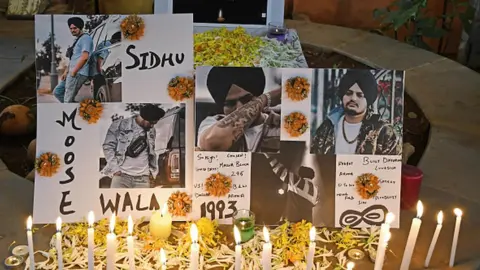 Getty Images
Getty ImagesWho was Sidhu Moose Wala?
Born as Subhdeep Singh Sidhu in Moosa village in Mansa district, the singer started his musical journey in Canada in 2016.
Since then, he had released three albums and more than 60 singles and become a household name in Punjab and among the diaspora Sikh population in the UK and Canada.
Fans loved how his songs offered unvarnished commentary on the dark underbelly of the rural heartland, where drugs, crime and corruption often make headlines.
Through his lyrics and delivery, which incorporated the styles of the region's folk music, the singer inspired a generation of young Punjabis living in India and abroad to proudly accept their roots.
But Moose Wala was also a highly controversial figure.
The edgy singer had an affinity for guns, which he would brandish in his music videos and on his social media profiles. He also had police cases against him for allegedly promoting gun violence in Punjab.
The singer was never convicted for any of the alleged crimes, but critics routinely called him out for "normalising violence".
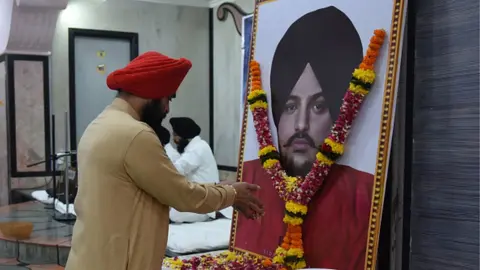 Getty Images
Getty ImagesWhy was Moose Wala killed?
It's hard to say, but the police suspect it to be a case of gang rivalry, though Moose Wala's family has strongly denied this. The police so far have been tight-lipped about the investigation, saying they were still looking into the motive for the shooting.
Punjab has always had an unsavoury side, involving gritty gangster lore - of big bosses, godfathers, their middlemen and thugs. The violence, experts say, largely stems from turf battles between them.
Underlying issues like corruption and rising unemployment have strengthened their reign over the state's cities and villages.
These gangsters also have a huge cultural footprint - the intertwined nature of the music industry and gang-related crimes in Punjab is largely accepted as common knowledge, says Ravindra Singh Robin, a senior journalist in Amritsar city.
"It's a bit like Bollywood," he adds, referring to the allegations of links with Mumbai's underworld.
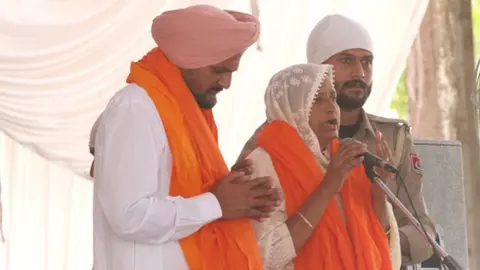 Getty Images
Getty ImagesWho has been arrested?
Police say that the investigation so far has revealed that all the accused were acting on the directions of two alleged key conspirators - whom they named as Lawrence Bishnoi and Canada-based Goldy Brar.
Lawrence Bishnoi, who has denied the allegations against him, is in jail in India. Police say they are trying to extradite Goldy Brar who has made no statements in connection with the Moose Wala case. On Monday, police said they had evidence that one of the shooters had been in direct contact with him at the time of the murder.
The Punjab police have also arrested eight others for "providing logistic support, conducting recce and harbouring the shooters".
In a press release, police said, one of the accused had kept tabs on the singer's movements by pretending to be a fan.
"He clicked selfies with the singer minutes before his murder. He then shared inputs - like the singer was not accompanied by his security personnel, details of the vehicle and number of occupants, that it was a non-bullet-proof Mahindra Thar vehicle - with the shooters and handlers operating from abroad," they added.
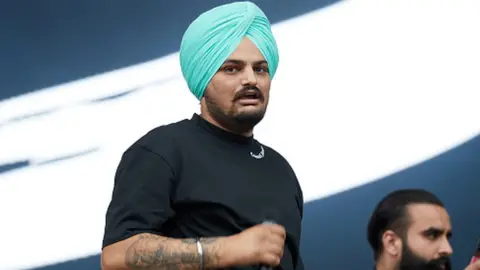 Getty Images
Getty Images'A small clue'
The investigation into Moose Wala's death has been far from easy, given the high-profile nature of the case.
For one, the singer was hugely popular and deeply revered by his fans, who have been angered by his murder.
The case, the police say, has also unearthed a wide and "sinister criminal alliance" spanning several states and cities. In Punjab, where authorities have formed a special investigative unit, officials had been gleaning the details of the case for days in search of clues and answers.
But the big lead came when the police recovered a fuel receipt dated 25 May, just days before the murder. The receipt was found in the car allegedly used for the crime, which was abandoned 13km (eight miles) from the spot where Moose Wala was shot.
A police team immediately went to the petrol pump which had issued the receipt, combed through its CCTV footage and managed to identify one of the shooters.
The footage also revealed the route the accused took to reach Moose Wala, according to police.
By tracing the car owner, the police also managed to recover all the vehicles used in the crime, they said.

More on India:

